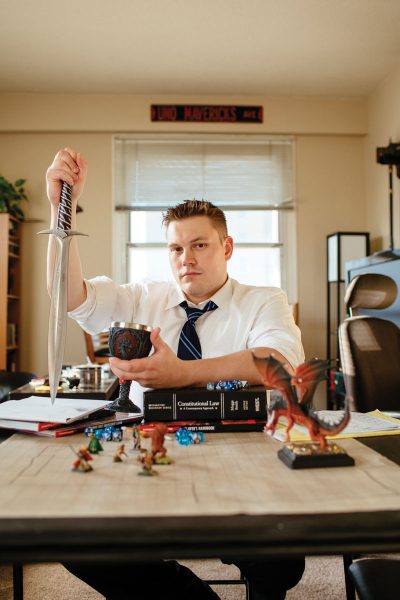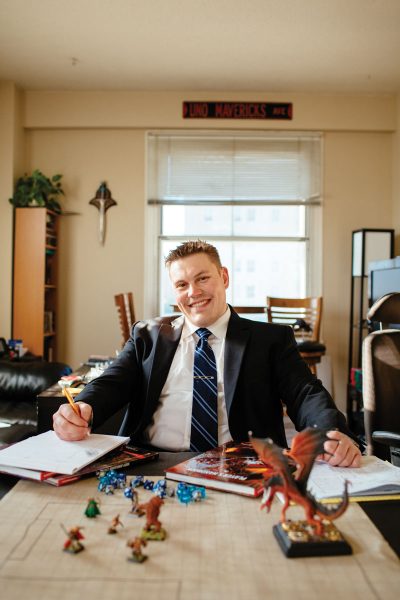Zack Carlson, 28, is a district court attorney by day. Come the weekend, he’s a dungeon master. One of the Omaha native’s favorite pastimes—Dungeons and Dragons (D&D)—allows him to swap his suit and tie for imaginary armor.
D&D requires a group of players to simulate fictional characters of their own devise in a fantastical setting. Popular styles of play incorporate elements of board-gaming, such as moving token pieces around a game board and rolling dice. Carlson compares the game experience to being in a Game-of-Thrones-style world in which one’s friends can also participate and make decisions. “It is awesome,” he says.
 The game, first published in 1974, shares themes with mainstream fantasy staples such as Lord of the Rings and World of Warcraft. For many players, including Carlson, playing D&D is about more than just an interest in the fantasy genre—it is about the community of individuals who share in that interest. Carlson explains that D&D differs from playing online games because “It is in the flesh. You have to physically be there.” In-person presence creates a social atmosphere that appeals to many players.
The game, first published in 1974, shares themes with mainstream fantasy staples such as Lord of the Rings and World of Warcraft. For many players, including Carlson, playing D&D is about more than just an interest in the fantasy genre—it is about the community of individuals who share in that interest. Carlson explains that D&D differs from playing online games because “It is in the flesh. You have to physically be there.” In-person presence creates a social atmosphere that appeals to many players.
Carlson considers D&D a catalyst for friendships that transcend the game. “I have made many friends this way,” he says, noting that he has played with people from many different professional backgrounds. His D&D gaming friends include a doctor, financial professional, research scientist, military personnel, and a police officer. His college fraternity house even had a D&D group (his first). He says that his gaming groups have not been gender exclusive, despite the prevailing stereotypes that D&D is for guys.
According to Carlson, the many misconceptions that persist today about D&D are not as misguided as they have been historically, when some concerned observers likened the game to a cult. Popular contemporary television shows, such as The Big Bang Theory and Community, now depict D&D players as nerd chic, geeky hipsters rather than Satanists—but nerds nonetheless. Players are thought of as people who are “not charismatic,” according to Carlson. “But that couldn’t be further from the truth,” he says. “D&D is a social activity.”
 D&D requires that groups of players collaborate to devise creative solutions to problems they face in the game. They might work together to defeat a monster. Characters might also clash sword-to-sword. “There is a competitive aspect to it,” says Carlson. Role-playing a character requires ad-libbing. “It can be kind of like improv comedy,” Carlson explains. “You get into ridiculous circumstances by everyone building off of one another.” Social interaction is the vehicle that drives the plot forward.
D&D requires that groups of players collaborate to devise creative solutions to problems they face in the game. They might work together to defeat a monster. Characters might also clash sword-to-sword. “There is a competitive aspect to it,” says Carlson. Role-playing a character requires ad-libbing. “It can be kind of like improv comedy,” Carlson explains. “You get into ridiculous circumstances by everyone building off of one another.” Social interaction is the vehicle that drives the plot forward.
Carlson reports that D&D uses much of the same skill set that he uses when practicing law. He explains that in both law and D&D, an arbiter settles disputes on the rules and interprets those rules when necessary. He notes that lawyers and players must be able to think on their feet. In law practice there is a real element of chance/randomness to any lawsuit, because it is impossible to know exactly what an attorney will find in discovery or what will happen at trial. In D&D chance is simulated with dice, which generates suspense.
Still, Carlson says his co-workers joke with him about being a nerd. “But it is good-natured,” he says. Although he does not go around telling people he plays D&D, Carlson does not deny it either; he even recruited another attorney from his office into his current D&D group. Carlson says, “nerd culture is becoming mainstream.”
Visit dnd.wizards.com for more information. B2B













